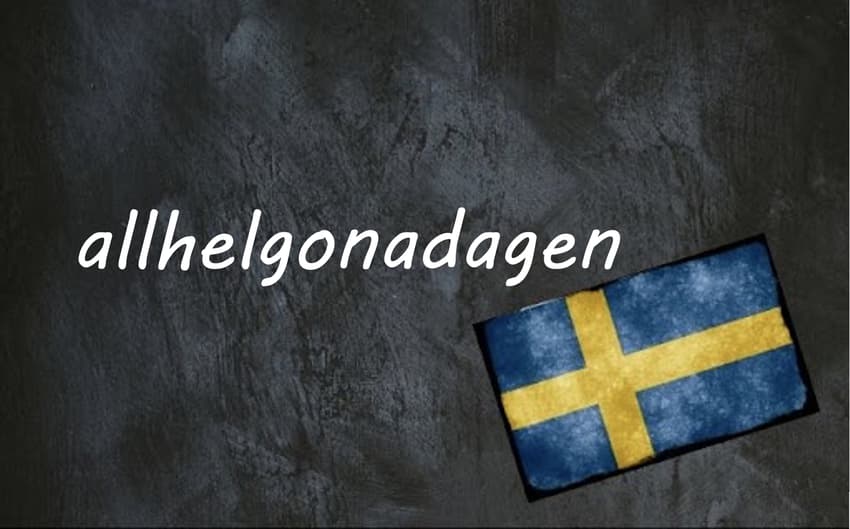Swedish word of the day: allhelgonadagen

Allhelgonadagen means All Saints Day, and is a religious festival marked on November 1st in Sweden as well as in several other countries, mostly Catholic.
You can break the word down quite easily into all ('all'), helgon ('saint', which is also the root of the word helg meaning 'weekend') and dag ('day').
Simple enough, you might think. But you'd be wrong.
Confusingly, Sweden also marks Alla helgons dag (which also translates as All Saints Day), and these are not the same thing.
To understand the difference, we have to go back more than 1,000 years. At this time, November 1st was chosen as the day to celebrate saints who didn't have their own designated feast day. From the 11th century, the following day was known as All Souls' Day and used to remember all the dead, whether saintly or not.
Allhelgonadagen is November 1st, and although this is a public holiday in some countries, that's not been the case in Sweden since 1772, when it was abolished because celebrating saints was not seen as consistent with Protestant Lutheran beliefs.
Alla helgons dag meanwhile is always marked on the first Saturday of November. Some companies in Sweden give employees a half-day holiday on the preceding Friday, but this isn't compulsory.
The two were interchangeable until the 1950s, which was when alla helgons dag was moved from a fixed position on November 1st to the first Sunday of November (it was a few years later that it was moved to the Saturday).
You'll also hear the term allhelgonahelg (All Saints weekend) used to refer to the entire weekend. And Halloween, the October 31st celebration marked with trick or treating and themed parties, is a recent import to Sweden but quite different from the subdued atmosphere of All Saints, which is marked by visiting candlelit graveyards and remembering the dead.
The term allhelgonadagen was first recorded in Swedish in the 12th century, and it is considered the first day of winter by some. So expect to see ski resorts opening after this date and julmust appear on shop shelves (if it hasn't already made an early appearance).
Examples
Allhelgonadagen firas alltid den 1 november
All Saints Day is always celebrated on November 1st
Fram till 1953 var allhelgonadagen och Alla helgons dag samma sak
Up until 1953, allhelgonadagen and Alla helgons dag were the same thing
Villa, Volvo, Vovve: The Local’s Word Guide to Swedish Life, written by The Local’s journalists, is now available to order. Head to lysforlag.com/vvv to read more about it. It is also possible to buy your copy from Amazon US, Amazon UK, Bokus or Adlibris.
Comments
See Also
You can break the word down quite easily into all ('all'), helgon ('saint', which is also the root of the word helg meaning 'weekend') and dag ('day').
Simple enough, you might think. But you'd be wrong.
Confusingly, Sweden also marks Alla helgons dag (which also translates as All Saints Day), and these are not the same thing.
To understand the difference, we have to go back more than 1,000 years. At this time, November 1st was chosen as the day to celebrate saints who didn't have their own designated feast day. From the 11th century, the following day was known as All Souls' Day and used to remember all the dead, whether saintly or not.
Allhelgonadagen is November 1st, and although this is a public holiday in some countries, that's not been the case in Sweden since 1772, when it was abolished because celebrating saints was not seen as consistent with Protestant Lutheran beliefs.
Alla helgons dag meanwhile is always marked on the first Saturday of November. Some companies in Sweden give employees a half-day holiday on the preceding Friday, but this isn't compulsory.
The two were interchangeable until the 1950s, which was when alla helgons dag was moved from a fixed position on November 1st to the first Sunday of November (it was a few years later that it was moved to the Saturday).
You'll also hear the term allhelgonahelg (All Saints weekend) used to refer to the entire weekend. And Halloween, the October 31st celebration marked with trick or treating and themed parties, is a recent import to Sweden but quite different from the subdued atmosphere of All Saints, which is marked by visiting candlelit graveyards and remembering the dead.
The term allhelgonadagen was first recorded in Swedish in the 12th century, and it is considered the first day of winter by some. So expect to see ski resorts opening after this date and julmust appear on shop shelves (if it hasn't already made an early appearance).
Allhelgonadagen firas alltid den 1 november
All Saints Day is always celebrated on November 1st
Fram till 1953 var allhelgonadagen och Alla helgons dag samma sak
Up until 1953, allhelgonadagen and Alla helgons dag were the same thing
Join the conversation in our comments section below. Share your own views and experience and if you have a question or suggestion for our journalists then email us at [email protected].
Please keep comments civil, constructive and on topic – and make sure to read our terms of use before getting involved.
Please log in here to leave a comment.